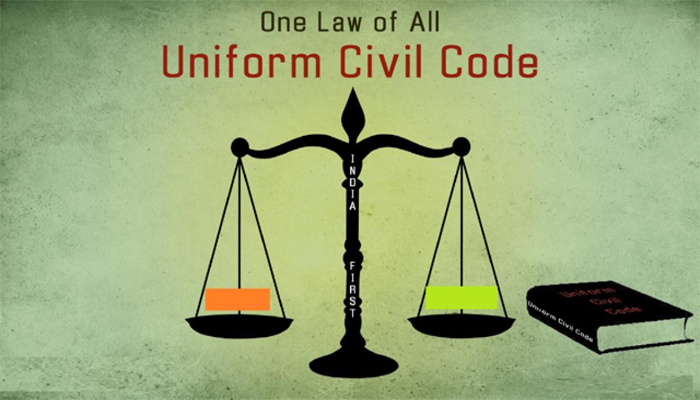TRENDING TAGS :
Delhi High Court to hear petition on Uniform Civil Code | Know what it is
Though a demand for a uniform civil code was made by Prime Minister Jawaharlal Nehru, his supporters and women activists, they had to finally accept the compromise of it being added to the Directive Principles because of opposition from the Muslim members in the Constituent Assembly of India.
New Delhi: The Delhi High Court will hear petitions on Uniform Civil Code today. High Court had also issued notices to the Union Home Ministry and Law Commission regarding the matter. BJP leader and advocate Ashwini Kumar Upadhyay and others have filed a Public Interest Litigation (PIL) regarding the Uniform Civil Code.
It is to be mentioned that the Delhi High Court will hear petitions on Uniform Civil Code as provided under Article 44 of the Constitution, to promote national integration as well as gender justice, equality and dignity of women.
ALSO READ: In swipe at United States, BRICS hit out at protectionism
A bench of Chief Justice D N Patel and Justice C Hari Shankar decided to hear the four petitions, which are seeking UCC, on November 15.
The first plea seeking a uniform civil code was moved by Ashwini Kumar Upadhyay in May this year. A similar plea was moved by another lawyer in August for directions to the Centre to constitute a judicial commission or a high-level expert committee to draft a UCC for securing gender justice, equality and dignity of women.
ALSO READ: Centre not providing funds that are due to Bengal: Mamata
A third plea was moved by Firoz Bakht Ahmed, the chancellor of Maulana Azad National Urdu University and the grandnephew of first education minister Maulana Abul Kalam Azad, in October. The fourth PIL for drafting a UCC was moved by Amber Zaidi, who claims in her plea to be a social activist and media personality.
What is Uniform Civil Code?
Uniform civil code is the ongoing point of debate regarding the Indian constitution's mandate to replace personal laws based on the scriptures and customs of each major religious community in India with a common set of rules governing every citizen.
Article 44 of the Directive Principles expects the state to apply these while formulating policies for the country.
ALSO READ: Bihar spent Rs 67,000cr on children from 2013-18: Sushil Modi
Apart from being an important issue regarding secularism in India & fundamental right to practice religion contained in Article 25, it became one of the most controversial topics in contemporary politics during the Shah Bano case in 1985.
Although Article 44 of the Indian Constitution guarantees UCC to all citizens, the debate arose when the question of making certain laws applicable to all citizens without abridging the fundamental right of right to practice religious functions.
The debate then focused on the Muslim Personal Law, which is partially based on the Sharia law, permitting unilateral divorce, polygamy and putting it among the legally applying the Sharia law.
ALSO READ: Happy birthday Sania Mirza | Know controversies surrounding the player
Personal laws are distinguished from public law and cover marriage, divorce, inheritance, adoption and maintenance. Goa has a common family law, thus being the only Indian state to have a uniform civil code. The Special Marriage Act, 1954 permits any citizen to have a civil marriage outside the realm of any specific religious personal law.
Personal laws were first framed during the British Raj, mainly for Hindu and Muslim citizens. The British feared opposition from community leaders and refrained from further interfering within this domestic sphere.
ALSO READ: PM Modi leaves for Delhi after completing ‘very productive’ BRICS Summit
The demand for a uniform civil code was first put forward by women activists in the beginning of the twentieth century, with the objective of women's rights, Equality and secularism. Till Independence in 1947, a few law reforms were passed to improve the condition of women, especially Hindu widows. In 1956, the Indian Parliament passed Hindu Code Bill amidst significant opposition.
Though a demand for a uniform civil code was made by Prime Minister Jawaharlal Nehru, his supporters and women activists, they had to finally accept the compromise of it being added to the Directive Principles because of opposition from the Muslim members in the Constituent Assembly of India.



